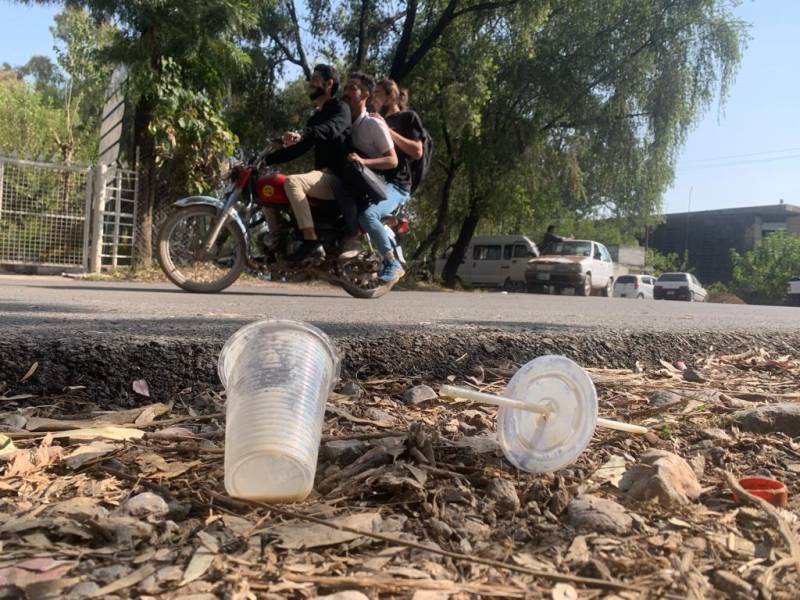
A disposable plastic glass lies a few inches away from the trash can on the Quaid-e-Azam University (QAU) Islamabad campus. Students walk past, not knowing that PET, also known as polyethylene terephthalate, a popular material used for plastic glasses can take anywhere from one hundred to five hundred years to decompose. Seeing single use plastic on a university campus is not surprising, and it’s not only the story at QAU.
Single use plastic is everywhere in Pakistan. The arrival of PET in Pakistan is not that old; in the eighties, Coca Cola and PepsiCo expanded their operations in the country and introduced their respective plastic bottles production line to South Asia. According to environmental studies around the world, one million plastic drinking bottles are purchased every minute, while up to five trillion single-use plastic bags are utilized, which has lead to a global plastic waste crisis.
As per UN assessments, more than 3.3 million tons of plastic is wasted each year in Pakistan, and if no action is taken, plastic waste is expected to reach 12 million tons annually by 2040, which will lead to significant damage to the environment and human health. Globally, countries have agreed to reduce plastic pollution; Pakistan has also followed suit and introduced new legislation to ban plastic, but has so far only achieved limited success in phasing out plastics in favor of more sustainable, organic solutions.
A couple yards away from the trash can is the QAU Department of Microbiology, where researchers discovered a plastic eating fungus, alongside Chinese researchers, in a garbage heap in Islamabad in 2017. But until recently, this was not considered a matter of great interest for policymakers. The plastic eating fungus solution for plastic pollution is yet be found in environmental litigation. Dr. Aamer Ali Shah, one of the researchers who discovered the plastic eating fungus, published a study titled “Biodegradation of Polyester Polyester Polyurethane by Aspergillus tubingenisis.” Dr. Shah told The Friday Times that his department has been working for 20 years to try and find a solution to plastic biodegradation.
Dr. Shah said that single use plastic pollution is one of the major issues for Pakistan, and the discovery of Aspergillus tubingensis can be a revolutionary way out, but it is not yet being facilitated by the government, and there are only limited resources for the team of researchers to continue to work on such solutions.
Fungus a natural solution for eradication of plastic
Plastic eating bacteria were first found in Japan in 2001. Dr. Aamer Shah told The Friday Times that his team is working on the degradation of synthetic and natural plastic. He said there are 7 types of plastic in Pakistan; common types are polyethylene used in plastic bags, polyethylene terephthalate, used in their namesake PET bottles, polystyrene, polyethylene, which is used in making foams, and polypropylene, used in fertilizer sacks. Dr. Shah said not all microorganisms can degrade plastic’ there are very limited types who have the potential to degrade plastic. Two types of microorganisms, bacteria and fungus, are explored for their utility in breaking down plastic. Fungi are more resistant to extreme environments. Some scientists prefer bacteria, and both have been explored by Dr. Shah’s team, but due to limited resources and funds, they are unable to advance research on both avenues simultaneously.
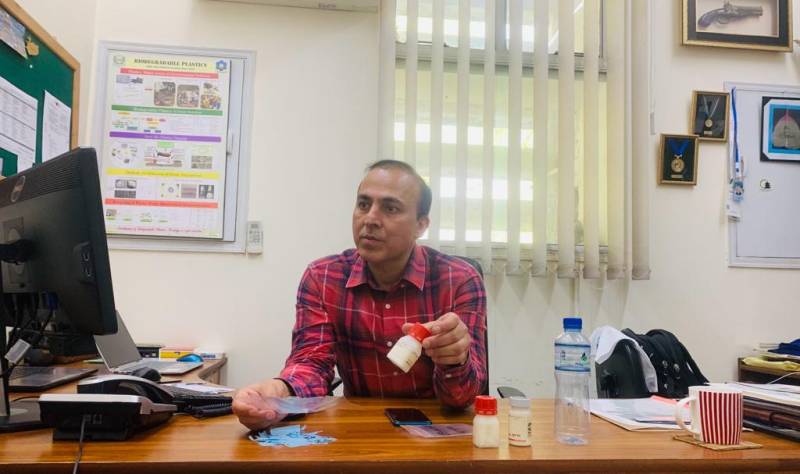
Dr. Shah told TFT that plastic media prices have risen 30 percent in the last two years and universities don’t have enough funds to buy plastic media to continue research. He suggested that we can solve the plastic pollution issue naturally, but it needs policymakers’ attention, and that we cannot eliminate plastic from our daily life – it is a truly ubiquitous product, found everywhere from plastic bottles to our clothes. Dr. Shah emphasized that everywhere means literally everywhere.
Plastic waste in Pakistan is primarily generated by urban areas, and the waste collection and disposal infrastructure is inadequate to handle the volume of plastic waste generated. Dr. Shah said his team’s research shows that 60% of plastic waste is generated in Punjab, followed by Sindh with 30%, KP with another 7% and Baluchistan generates 3%. During the past 60 years, plastic has become the most attractive material for a whole host of products, yet the disposal of plastic waste and products can lead to environmental pollution, blockage of sewage system in cities, resulting in foul smell. In agricultural soil, plastic can affect aeration that leads to reduced productivity, and plastic waste releases highly toxic substances such as benzene and PAH into the water and air. He said plastic waste affects our food chain, and has deep impacts on human health and soil biodiversity.
Pakistan’s fight against plastic pollution
According to World Bank’s site assessments in 2023, the Indus delta is facing the burden of plastic pollution. Aquatic ecosystems and surrounding habitats are being egregiously harmed by lagging plastic and solid waste management, inadequate legal frameworks, lax enforcement of environmental laws, and the truly astronomical rise in single-use plastics like straws, plastic bags, water bottles – all of which are thrown and often dumped into river bodies. Rural communities, which are dependent on the Indus’ waters, are directly impacted by plastic pollution, which causes severe health impacts downstream. Around 11,977 tons of plastic waste reaches the mouth of the Indus annually, nearly 10,000 tons making its way into the ocean to harm coastal and marine life.
Pakistan is partnering with the World Economic Forum to fight plastic pollution. In February 2022, in Geneva, Switzerland, Pakistan has joined the World Economic Forum’s Global Plastic Action Partnership (GPAP), which aims to end plastic waste and forge an international, legally binding agreement by 2024.
In this regard, Pakistan’s Environmental Protection Agency has introduced new regulation – the Single Use Plastics Prohibition Regulations 2023. These regulations shall apply to the Islamabad Capital Territory, and include a timeline for the prohibition of various single-use plastic items. Starting from 1st August 2023, single-use plastic crockery, such as plates, bowls, cups, and glasses and single-use plastic cutlery, including forks, knives, spoons, and chopsticks will no longer be permitted.
The regulations for reduced plastic waste were announced by Prime Minister Shehbaz Sharif on World Environment Day, 5 June 2023.
Since 1997 to 2023, updated laws have been enacted for the protection, conservation, rehabilitation and the improvement of the environment in Pakistan. As per new regulation In Islamabad Capital Territory ICT, the manufacture, import, distribution, sale, supply, stocking, purchase, trade or use of single-use plastic items shall be prohibited. Similarly, there is a ban on single-use plastic followed by Punjab, KP and Sindh – and yet plastic bags, bottles and plastic packaging are widely used in Pakistan and all of those are non-biodegradable and have a negative impact on environment.
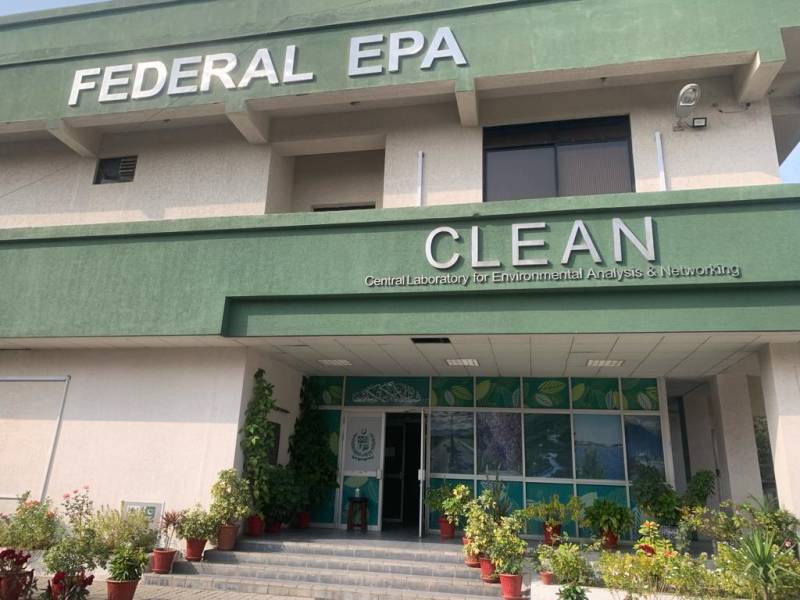
The Pakistan Environmental Protection Agency’s Islamabad deputy director Sadia Munawar told TFT that the minimum fine is 10,000. In the year leading up to October 2023, the EPA has imposed Rs 3,030,000 in fines in the capital, and the EPA ICT administration imposed 725,000 in fines from September 2021 to September 2022. The ICT Administration and EPA combined inspected over 30,000 shops and confiscated around 12,000 kg in plastic bags. Responding to data about plastic production and recycling in Pakistan, Munawar said that data availability is a challenge because of the informal nature and scale of the industry. Most plastic manufacturing units are located outside of urban areas. Responding to a question of alternative solutions, Sadia said the department is focusing on banning single-use plastics.
Is a ban on single-use plastic in Pakistan a permanent solution?
Alam Shah, a 40 year old owner of a grocery shop in Wah Cantt says when the news of the ban on single use plastic reached him, and he decided to purchase biodegradable plastic bags, costumer were not interested in using them. Many complained that the alternatives were not as reliable as plastic bags, Alam said. He professed to not having biodegradable bags, and using bags imported from Iran; he claimed that no shop in the markets carries biodegradable bags. Regulations banning single-use plastics exist in Pakistan, but in the provinces, no proper action has been taken yet under the updated regulations. The Khyber Pakhtunkhwa EPA and Punjab EPA officials told The Friday Times that they are looking forward to implement the ban soon, while in ICT, action on ban of single-use plastic has been implemented since 2019.
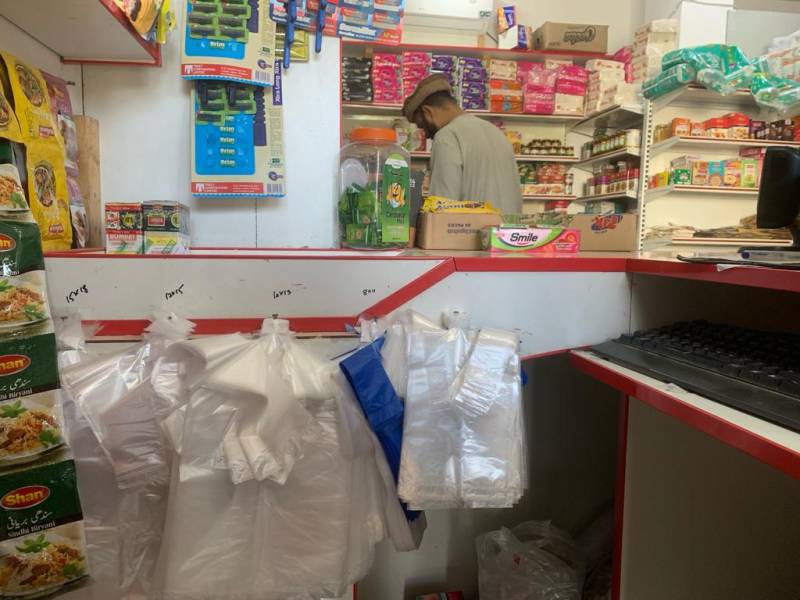
After the new regulation ban on polythene bags which hare still available in markets in ICT, Munawar said that the EPA has instituted an enforcement team that carries out field inspections. She explains that plastics are a part of the daily life of millions of people and there is a need for ownership of the community. A huge chunk of commercial activity is dependent on these products and many businesses are heavily dependent on plastic. She said that the EPA is trying to reduce the gap between academia and engage M.Phil and Ph.D students as interns, seeking to providing them lab resources.
A superlative example of this collaboration is Maria Qayyum, founder of Green Plastic, who discovered her inspiration to develop plastic alternatives during her internship at the EPA. Maria holds an M.Phil in Environmental Sciences from Fatima Jinnah Women’s University and is an entrepreneur strive to eradicating plastic pollution by making plastic from organic waste - potato peels. Maria, who is 25, with the help of her teacher and M.Phil research supervisor, started the initiative to manufacture plastic bags from banana and potato peels.
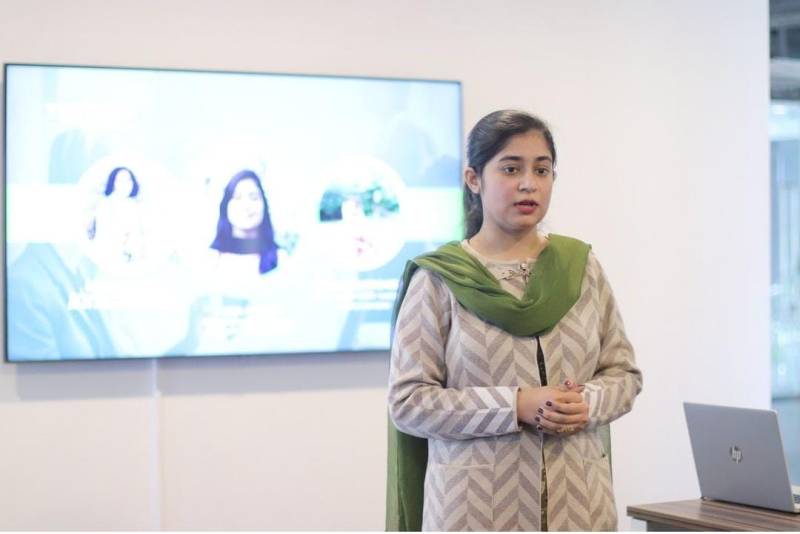
Qayyum told TFT that in Pakistan, establishing a green biodegradable plastic business is not easy, and replacing polythene bags with biodegradable plastic bags needs true commitment from the government. She said that in the beginning, with the help of Dr. Tabassum, we secured 1.7 million for research on synthesizing plastic from potato peels, but to continue this initiative as a sustainable business is very difficult, especially as a woman in the plastic market. Qayyum said it is a matter of great regret that many startups in Pakistan face closure due to the lack of financial assistance and proper guidance.
“There was a time when I was on the verge of shutting down my startup Green Plastic, because there seemed to be no available funding sources, and to date, we haven't secured substantial funding, existing in a continuous state of struggle.” Maria also echoed the claims made by others, suggested that it is difficult to eradicate plastic exclusively through banning, and that a solution needs a comprehensive plastic management plan - including incentivizing people’s behavioral change and offering alternatives. She told TFT that if we look at Europe, 50% of their plastic market has shifted towards bio-plastics. She added that there are plastic recycling initiatives and plants in other developing countries, but in Pakistan plastic recycling is an almost unheard of industry.
The mystery of plastic recycling in Pakistan
According to the Punjab Environmental Protection Department’s strategy for plastic pollution, the plastic industry is one of the fastest-emerging industries in Pakistan. Approximately 11,000 plastic manufacturing units operate in the formal and informal sectors, dealing with plastic in Pakistan, with 65% of them located in Punjab. According to the document, Pakistan earned 386 million US dollars through exports during July-May 2021-21, compared to 271 million during July-May 2020-21, reflecting an increase of 42.3%.
According to EPA Peshawar, there are 81 plastic manufacturing units in the province, all of which were closed after the new 2022 regulation banning plastic products. Responding to the presence of plastic recycling plants, the EPA doesn't have any data.
Fasahatmand Khan, associated with the plastic industry for 25 years, is the 60-year-old General Manager of Lasani Fiber Industries in Lahore. For the last 10 years, he has been involved in PET bottle recycling to polyester. He told TFT that the number of plastic production units is higher than 11,000. He mentioned that plastic recycling is also a hidden business in Pakistan.
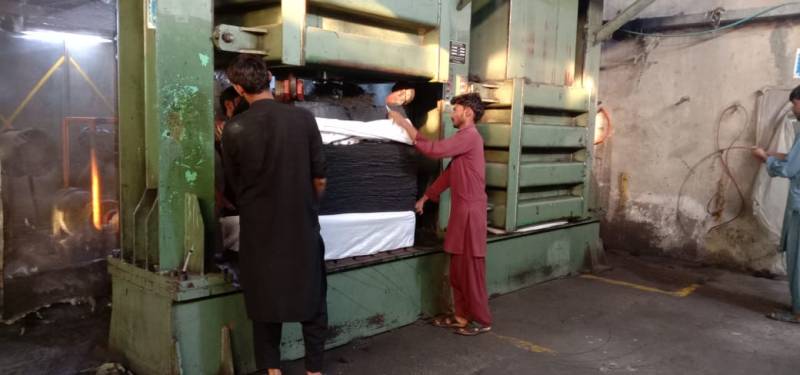
Khan recycles 50 tons of plastic on a daily basis. According to his knowledge, there are eight large industrial units, including his own, specifically focused on recycling PET bottles. There are many small units that are recycling plastic waste in an inappropriate way, he said. Sustainable recycling of plastic is not an easy process; it needs evidence-based policies. He criticized the new plastic regulations, stating they were made in a hurry just to meet international pledges. He highlighted that they pay taxes but are not facilitated by the government. He gave examples of the recycling industry in the US and other countries, stating that they are more environmentally friendly than recycling plants in Pakistan. Cheaper fiber and other plastic materials are made from recycling here, impacting human health.
Forgotten solutions
Dr. Shah mentioned that plastic-eating fungi and similar research could lead to sustainable solutions. He emphasized that the ignorance of policymakers and the lack of evidence-based new plastic laws cannot eradicate plastic pollution. Ignoring plastic pollution is impossible, he said. Around 7 billion of the estimated 9.2 billion tons of plastics produced between 1950 and 2017 are now waste. He stated that, according to environmental studies, an estimated 75 to 199 million tons of plastic waste are currently in our oceans, with 33 billion pounds of plastic entering the marine environment every single year. Approximately 100 million marine animals die each year from plastic waste.
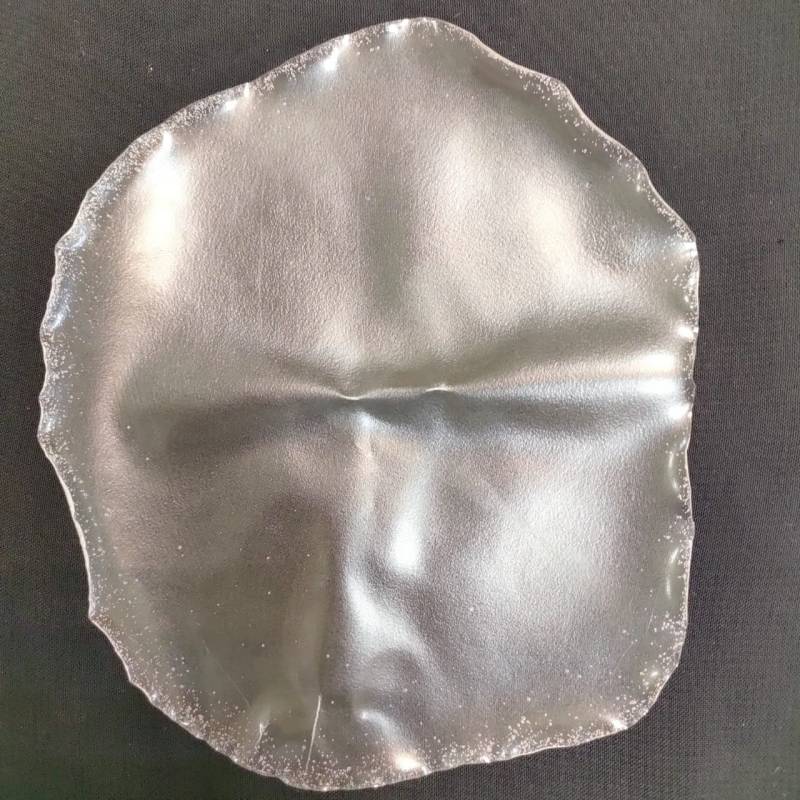
Maria pointed out that Pakistan produces a substantial amount of agricultural waste every year, which can be utilized not only to create biodegradable plastic packaging but also to develop highly valuable products. In our country, the preference for biodegradable plastic is hindered by its higher price. However, it's essential to consider that without the development of a market for a particular product, price stability cannot be achieved, she added. Market development is crucial for price stability, and the government can play a significant role in this regard. Banning plastic is not a solution to the problem; instead, efforts should be directed towards increasing the market for alternatives like bio-plastic. In addition to that, the plastic developed in our country relies on raw materials imported from foreign countries.
Pakistan does not produce its own raw materials, such as biodegradable plastic pellets for plastic packaging. We are dependent on imports, which is a significant drawback hindering the growth of the biodegradable packaging market in Pakistan. She said that to address this issue, governments should invest in sustainable solutions, invest in research in universities, and support the biodegradable plastic market.

